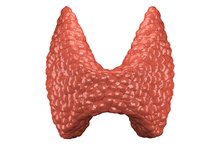Low Libido, Weight Gain and 4 Other Signs Your Hormones Are Out of Whack
When your hormones are thrown off balance, you definitely notice something is wrong. The causes of these off-kilter chemicals range from diseases like diabetes, Cushing syndrome or thyroiditis to lifestyle issues like stress and eating disorders as well as natural parts of life like pregnancy and menopause.
The problem is that many of the signs of a hormonal imbalance could also indicate other medical issues. So the only way to truly know if your hormones need a little help is to visit a doctor. If you experience a number of the following symptoms for a significant period of time, ask the doctor to run some tests to get it figured out.
1. Acne
You thought you left painful pimples behind when you aged out of your teen years, but hormones play a lifelong role in causing acne. "Acne has many different mechanisms," says Gerrit Keferstein, M.D., of The Performance Doc. "One mechanism is via increased metabolism from [the hormones] testosterone to DHT. This increases the likelihood of acne."
Read more: 11 Warning Signs Your Skin Is Sending You
2. Weight Changes
What Causes Women to Get Hair Growth Around Their Nipples?
Learn More
Both weight gain and weight loss can indicate hormonal issues. First, increased fat around the midsection could mean an imbalance of testosterone and estrogen triggered by insulin resistance, says Keferstein.
Second, hormone conditions like hypothyroidism and Cushing syndrome can lead to weight gain. With hypothyroidism, low levels of thyroid hormones wreak havoc on metabolism, while those with Cushing syndrome suffer from high blood cortisol levels. This causes increased appetite and fat storage. Lastly, those who have low levels of thyroid hormones might experience sudden weight loss instead. In the case of both weight gain and weight loss, it can’t be explained by a sudden change in diet or physical activity habits.
3. Fatigue
A number of hormonal disorders can make you more tired than usual, but one hormone in particular — or, rather, the lack of that hormone — can make you feel sleepy all the time. Melatonin regulates your body’s circadian rhythms, but your body naturally produces less of it as you age.
So some adults might need to take melatonin supplements to help them sleep better at night. Thyroid hormone imbalances, as well as an excess production of the hormone progesterone, could also be the root cause of unrelenting fatigue. On the flip side, too little progesterone can be a major cause of insomnia, as can an overactive thyroid.
Read more: 9 Surprising Reasons You’re Tired All the Time
4. Hair Loss
How to Diagnose PCOS While on the Birth Control Pill
Learn More
When a woman has hormonal issues due to pregnancy, giving birth or menopause, she’ll often experience temporary hair loss. Both hypo- and hyperthyroidism — that is, an over- or underproduction of thyroid hormones, respectively — can also cause hair loss, according to Harvard Women's Health Watch. In men, hair loss isn’t usually a sign of a hormonal imbalance, but rather is caused by genetics.
5. Excess Hair Growth (Hirsutism)
One of the most common hormonal imbalances for women is polycystic ovary syndrome, also known as PCOS, according to the Endocrine Society. While typical symptoms of PCOS include heavy or irregular periods, according to the Society of Endocrinology, excess hair growth (otherwise known as hirsutism) is a significant indicator too. Someone experiencing hirsutism might notice hair growth on the face, chin or other parts of the body except the head. This hormonal imbalance interferes with ovulation, so women who suffer from the condition often have fertility problems.
6. Decreased Sex Drive
A low libido can indicate hormonal imbalances in both men and women due to the decreased production of testosterone. In the years leading up to menopause for a woman, the ovaries and adrenal glands slow down production of this sex hormone, leading to decreased sex drive. Women might also experience vaginal dryness — which is also a symptom of PCOS — while men could suffer from erectile dysfunction. Like so many other symptoms, low libido can also be caused by a dysfunctional thyroid.
Read more: 10 Not-So-Obvious Things That Are Killing Your Sex Drive
Other Possible Symptoms
Though these are the most common symptoms that are easily attributable to a hormonal imbalance, it’s not an exhaustive list. Hormones control so many functions within the human body that it’s also possible to experience increased sensitivity to cold or heat, changes in the frequency of your bowel movements or urination, dry skin, a puffy or rounded face, changes in your heart rate, muscle weakness, increased thirst, muscle aches or joint pain. To determine if these symptoms are hormone-related, it’s best to see a doctor.
When to See a Doctor
If you suspect you’re having issues with your hormone levels, make an appointment with your doctor to discuss your symptoms. While there’s no single test that can diagnose all hormonal issues, there are a number of diagnostic tools, including a blood test, Pap smear/scrotum check and ultrasound to get images of the reproductive organs, thyroid or pituitary gland. Treatment for off-balance hormones will depend on what type of hormone is out of whack and, in some cases, what’s causing the problem.
What Do YOU Think?
Have you ever experienced issues with your hormones? What symptoms did you experience? Which of the symptoms on this list were the most surprising? Share your thoughts, questions and experiences in the comments section below!







